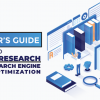
What is SEO / Search Engine Optimization?
One of the biggest question in today's digital world is- what is SEO and its operation. If you are in the process of building your website or going through a website redesign, SEO is a hot topic to think about. Different people have their own ideas and implementation. But it doesn't have to be that way you still can bring some positive and improve your brand's search engine ranking in no time even with a little SEO knowledge.
We are trying our best to explain SEO and it's operation. We will cover some basics of SEO so that you can understand it better and bring changes to your webpage.
Let's get started with definition, Search engine optimization is the process of getting the website traffic by increasing visibility of webpage to users of the web search engine. It simply means increasing the quality and quantity of organic visitors on your webpage. It also involves making changes in the content and website to make it more attractive to search engines.
There are different factors to be considered for SEOs to impact your ranking but the basics are not as difficult to understand. If you are a businessman, all you wish is to provide good services and products to your customer for their satisfaction, right? The same goes for a search engine that delivers not only high-quality content but also relevant to what the searcher is looking for.
To do this, the search engine will scan through different websites to better understand what the site is all about. This process helps the search engine deliver the relevant content to the person searching for particular topics or keywords. This scanning helps search engines to determine how easy is it to navigate and read the particular site.
Organizations go through SEO to help their site rank high in search engines for particular keywords. By improving SEO anyone can expand their business by engaging more potential and organic customers.
Even though we do have a few clues about google, nobody knows exactly how SEO algorithm works. We can also rank our site in various search engine but Google is used widely today and has one of the most reliable algorithms so far.
How SEO works?
To understand it simply, it works by demonstrating that your content is the best result for a particular keyword at hand. As stated before the major goal of all search engines is to deliver the most relevant results to their users. But all search engines do not have a common algorithm. The ranking algorithm of Google and YouTube is completely different. We will be focusing more on Google as it is the biggest and most popular search engine at present.
Going back to 2010 Google had up to 10,000 different ranking factors. These days Google famously uses more than 200 ranking factors. Nobody is aware of all the ranking factors that Google uses but we do know some. One thing to keep in mind is that Google ranks webpages and not websites. You can rank for different keywords and topics with different pages.
Here is a list of things that affect search engine visibility and ranking.
1. Crawlability
The first thing that Google should know is the existence of your webpage. According to Google " Crawlers look at webpages and follow links on those pages, much like you would if you were browsing content on the web. They go from link to link and bring data about those webpages back to Google's servers".
Google uses various algorithms to discover new content on the web however primary method is Crawling. It uses a computer program called a spider to perform a Crawling operation. For example, if your homepage contains backlinks from an indexed website, Google will follow that link to discover your website's homepage in the next crawling session and probably add it to their index.
Here are some of the factors that may Block Google Crawlers
1. Noindexed pages
Noindex "no index" is a meta tag that is entered into the head section of the page's HTML. You can exclude pages from Google's index but if you have other pages having only internal links from noindexed pages, then there is a chance that Google won't find them.
2. Poor internal linking
Pages without internal links won't get crawled by Google as it relies on internal links to crawl through all pages.
3. Nofollowed internal links
Internal links with nofollow tags also won't be crawled by Google.
4. Blocks in robots.txt
Google won't crawl on your website if it includes robots.txt. It is a text file that tells Google where it can go and where it can't on your website.
2. Pagespeed
The most important ranking factor in desktop and mobile is page speed. Pagespeed is how fast your page loads. Google doesn't want to dissatisfy its users so it offers results from the page having higher page speed. You can use Google's page speed Insights tool for checking the speed of your web pages.
3. Mobile-friendliness
As we all know that 63% of Google searches come from mobile devices and is increasing day by day. In 2016, Google announce a ranking boost for mobile-friendly websites in its mobile search results. Google allowed the mobile version of the page for indexing and ranking from 2018. According to the data provided by Adobe 8 out of 10 people would stop engaging with the content that doesn't display well on their devices
As stated earlier, Google wants to keep its customer satisfied right? So even if you rank and win the click most people won't stick around to consume your content. You can test your site with Google's mobile-friendly testing tool.
4. Search intent
To find a keyword that you want to rank for is easy. There are various keyword research tool and can simply paste a topic to generate keyword ideas with search volume. Make sure to align your page with the chosen keyword. You can also study content type, format and angle of top-ranked web pages.
5. Backlinks
Backlinks play a very important role in SEO. Google interprets backlinks as votes and the pages with more votes tend to rank higher. Links are challenging to build but there are tons of link building techniques. An obvious way to do this is to search for target keywords on Google and look for the pages that aren't as good as yours. You can go to backlink checker sites and check for top links. Reach out to the people explaining your content is better and ask them is they'd swap out the link for yours.
This technique is known as the Skyscraper Technique. Remember that backlinks hold various weights. Backlinks from high-authority pages are stronger than those from low-authority pages. In 2016 Google discontinued public PageRank scores but there are some similar metrics like Ahrefs URL Rating. Always prioritize building links form stronger pages over weak ones.
6. Quality Content
Google ranks the most useful and reliable content. Google looks for trustworthiness, authoritativeness, and expertise. As most Americans read to a 7th or 8th-grade level it is better to stick to this level. Consider using short sentences and paragraphs.
Make your content beautiful with the addition of images, quotes, etc. The freshness of the content also can be an important factor in some searches.
How To Write SEO Friendly Articles - Beginner's Guide
Was this helpful? Let us know if you have any questions regarding SEO.

















Readers Comment